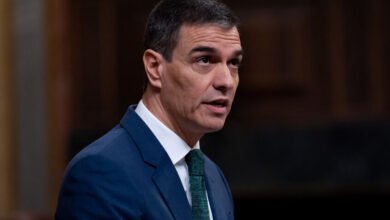Algeria Between Capitulation to Paris and Evading Its Southern Neighbors
April 6, 2025 – a date to be marked with a black stone in Algeria’s history. Never before has the country of one and a half million martyrs suffered such humiliation, both from its former colonizer and from three neighboring countries to the south—formerly friends and allies.

By Hichem Aboud
While President Tebboune, surrounded by his Foreign Minister and the Secretary-General of the Presidency, capitulated before Jean-Noël Barrot, the French Foreign Minister, Mali denounced Algeria for having shot down one of its drones on the night of March 31 to April 1 and accused it bluntly of “sponsoring international terrorism.” Mali also announced it would file a complaint with international bodies against the Algerian regime for acts of aggression. Niger and Burkina Faso, fellow members of the Sahel States Alliance, joined Mali in its action. All three countries decided to recall their ambassadors from Algiers for consultation.
These countries, already drawn toward Morocco’s recent Africa strategy—which opened an Atlantic corridor to the Sahel and strengthened cooperation in several fields including military—have increasingly voiced irritation over Algeria’s underhanded policies. The College of Heads of State of the Sahel Confederation, led by General Assimi Goïta, condemned Algeria’s meddling in their internal affairs. Mali repeatedly denounced Algerian interference, particularly when President Tebboune received Bamako’s Imam Mahmoud Dicko in December 2023, alongside his former intelligence chief, Major General Djebbar M’henna.
Faced with this rebellion from its southern neighbors, Algeria chose silence. Rather than confront the situation, it evaded it. Meanwhile, crumbling under the weight of its strained ties with its former colonizer, Algeria received France’s Foreign Minister, who was “invited” to deliver a roadmap likely crafted under the influence of Bruno Retailleau, France’s Interior Minister and a sworn enemy of Algiers. This was a formal capitulation, but Algerian generals—masters in spinning defeats into victories—presented it as a triumph against the “French far-right,” blamed for recent tensions between the two countries.
They conveniently ignored the fact that the crisis began on July 30, when France acknowledged Moroccan sovereignty over the Sahara through a message from President Macron to King Mohammed VI on the occasion of the Throne Day. Tebboune reacted by recalling his ambassador from Paris immediately. France did not respond. Algeria continued its hostile acts until Franco-Algerian writer Boualem Sansal was abducted upon his arrival at Algiers airport. After five days of silence, his family spoke out, drawing attention from France’s political class—including Macron, who described Sansal’s imprisonment as a disgrace for Algeria.
The tension escalated further. France expelled Algerian influencers inciting hatred and violence, but Algeria refused to receive them. It also declined to accept a list of 80 Algerian nationals deemed threats to French security. Additionally, Algeria refused to issue travel documents for citizens subject to OQTF (orders to leave French territory).
Outwardly, Algeria seemed defiant—calling for resistance against the former colonizer and reviving old revolutionary rhetoric. The regime played on nationalist sentiment to mobilize the population against the “evil France” and its nostalgic far-right. This continued until the graduated retaliation reached the regime’s elite: Paris decided to revoke visa exemptions for holders of Algerian diplomatic passports. Everyone—regardless of status—would now require a visa, announced Retailleau. Ordinary citizens and regime dignitaries were suddenly treated equally.
Unable to secure French visas, Algerian authorities negotiated an agreement to exempt diplomatic passport holders. These passports are issued not just to diplomats, but also to generals, their spouses and children, former ministers, senior officials, and others.
All these privileged individuals were now barred from weekend getaways and shopping trips in Paris. France was no longer accessible, which led Algerian decision-makers to rethink. A quick exit from the crisis was needed. To hell with the Polisario and France’s recognition of Moroccan sovereignty—source of this unprecedented diplomatic rift. “Good relations between France and Morocco don’t bother us. It’s not new,” they said. Gone was the angry statement by Ahmed Attaf’s ministry condemning the French culture minister’s visit to Laayoune. Forgotten was the visit by Gérard Larcher, president of the French Senate, to Morocco’s Saharan provinces. Boualem Sansal was no longer “the impostor who doesn’t know his identity or father,” as described by Tebboune.
Let bygones be bygones. Let’s invite Mr. Barrot to dictate his roadmap. It all happened on April 6, 2025—a date that will soon mark the release of writer Boualem Sansal and the deportation of OQTF cases. Algeria has stopped demanding the extradition of exiled opponents in France, and even turned a blind eye to the recent visit of Ferhat M’henni to the French Senate—not as leader of the separatist MAK movement, but as the “Prime Minister” of the Kabyle government-in-exile.
Shhh… don’t wake the demons.





